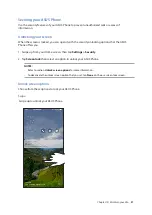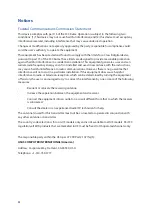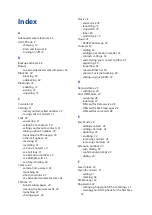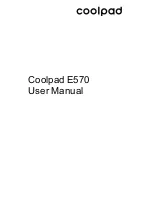
93
RF Exposure Information (SAR)
This device has been tested and meets applicable limits for Radio Frequency (RF) exposure.
Specific Absorption Rate (SAR) refers to the rate at which the body absorbs RF energy. SAR limits
are 1.6 Watts per kilogram (over a volume containing a mass of 1 gram of tissue) in countries that
follow the United States FCC limit and 2.0 W/kg (averaged over 10 grams of tissue) in countries
that follow the Council of the European Union limit. Tests for SAR are conducted using standard
operating positions with the device transmitting at its highest certified power level in all tested
frequency bands.
To reduce exposure to RF energy, use a hands-free accessory or other similar option to keep this
device away from your head and body. Carry this device at least 10 mm away from your body to
ensure exposure levels remain at or below the as-tested levels. Choose the belt clips, holsters,
or other similar body-worn accessories which do not contain metallic components to support
operation in this manner. Cases with metal parts may change the RF performance of the device,
including its compliance with RF exposure guidelines, in a manner that has not been tested or
certified, and use such accessories should be avoided.
The highest FCC SAR values for the device (ASUS_X017DA) are as follows:
•
0.74 W/Kg
@1g(Head)
•
1.06 W/Kg
@1g(Body)
The FCC has granted an Equipment Authorization for this device (ASUS_X017DA) with all reported
SAR levels evaluated as in compliance with the FCC RF exposure guidelines. SAR information on this
device is on file with the FCC and can be found under the Display Grant section of www.fcc.gov/
oet/ea/fccid
after searching on FCC ID: MSQX017DA.
FCC Statement (HAC)
This phone has been tested and rated for use with hearing aids for some of the wireless
technologies that it uses. However, there may be some newer wireless technologies used in this
phone that have not been tested yet for use with hearing aids. It is important to try the different
features of this phone thoroughly and in different locations, using your hearing aid or cochlear
implant, to determine if you hear any interfering noise. Consult your service provider or the
manufacturer of this phone for information on hearing aid compatibility. If you have questions
about return or exchange policies, consult your service provider or phone retailer.
The Federal Communications Commission has implemented rules and a rating system designed to
enable people who wear hearing aids to more effectively use these wireless telecommunications
devices. The standard for compatibility of digital wireless phones with hearing aids is set forth
in American National Standard Institute (ANSI) standard C63.19-2011. There are two sets of ANSI
standards with ratings from one to four (four being the best rating): an “M” rating for reduced
interference making it easier to hear conversations on the phone when using the hearing aid
microphone, and a “T” rating that enables the phone to be used with hearing aids operating in the
telecoil mode thus reducing unwanted background noise.
The Hearing Aid Compatibility rating is displayed on the wireless phone box.
A phone is considered Hearing Aid Compatible for acoustic coupling (microphone mode) if it has
an “M3” or “M4” rating. A digital wireless phone is considered Hearing Aid Compatible for inductive
coupling (telecoil mode) if it has a “T3” or “T4” rating.
The tested M-Rating and T-Rating for this device (ASUS_X017DA) are M4 and T3.
Summary of Contents for ZC600KL
Page 1: ...ZC600KL User Guide ...










































